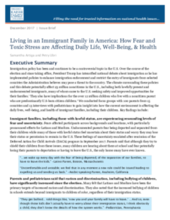Displaying 231 - 240 of 490
This presentation explores the developmental assessment of young children living in out-of-home care using the Ages and Stages Questionnaires® Third Edition.
This document from the U.S. National Child Traumatic Stress Network (NCTSN) identifies existing NCTSN resources related to traumatic separation, refugee and immigrant trauma, and best practices in trauma-informed care for refugee and immigrant children and families.
The Nourished and Thriving Children toolkit was designed by SPOON to build capacity among the foster care community in feeding and nutrition topics so that they are equipped to address challenges commonly experienced by foster children.
This exploratory paper’s purpose is to determine the effect of demographic, risk, and protective factors on social-emotional development, as measured by the Ages and Stages Questionnaire Social Emotional (ASQ:SE), in children age 8 months to 5 years in out-of-home care in Ontario, Canada.
The Nurturing Care Framework provides a roadmap for action. It builds on state-of-the-art evidence about how early childhood development unfolds and how it can be improved by policies and interventions.
This video from Catholic Relief Services provides an overview of the Thrive II project, a program designed to enhance parent-child bonds and strengthen early child development.
The authors of this study conducted focus groups with 100 parents from 15 countries and 13 interviews with pediatricians to gain insight into how the current political environment in the United States is affecting the daily lives, well-being, and health of immigrant families, including their children.
In this study, 30 primary school aged UK adoptees without a history of institutionalisation completed an assessment of their intellectual, executive functioning and social communication abilities.
This study examined facial emotion recognition in 12-year-olds in a longitudinally followed sample of children with and without exposure to early life psychosocial deprivation (institutional care).
This chapter describes the contemporary situation of children in sub-Saharan Africa with successive foci on child growth, the home environment, parenting, and discipline using data from the Multiple Indicator Cluster Survey (MICS).



